Having a baby or thinking about getting pregnant? Here’s 5 reasons to embrace real food nutrition for pregnancy.
Today’s post is brought to your by our esteemed RD colleague and friend, Lily Nichols. Lily is the author of the best-selling Real Food For Gestational Diabetes and the new Real Food For Pregnancy. We’re so excited to have Lily here to share her best advice when it comes to real food nutrition for pregnancy. So without further ado, here’s Lily!
The importance of eating a nutritious diet during pregnancy is well established. Most people are well-aware of this fact and want to do the best for their baby’s development, but often there’s conflicting information on what foods are best to eat during this time.
A diet based on real food is naturally very nutrient-dense, making it the perfect option for pregnant women. It doesn’t take a nutrition degree to explain that a diet focused mostly on real food (vegetables, meat, fish, eggs, dairy, nuts, seeds, legumes, fruit, etc.) versus a diet that contains more processed foods (pasta, cereals, crackers, chips, sweets, etc.) is better for you.
But, of course, I am a dietitian/nutritionist and my passion is prenatal nutrition, so I want to take a moment to zero in on some specific reasons why you should eat real food during pregnancy.
5 reasons why you should eat real food during pregnancy. #realfood #pregnancy Click To Tweet
1) Optimize Micronutrient Intake
My approach to prenatal nutrition is to reverse engineer what to eat based on the requirements for micronutrients and where we find them in real food. This is different than conventional recommendations that tend to focus on getting a certain number of servings from all the food groups or relying on fortified foods to meet nutrient needs.
Research has found that women who get their carbohydrates primarily from real foods with a low glycemic index (like vegetables, nuts/seeds, berries, and legumes/beans) have significantly higher micronutrient intake. In contrast, women who eat more starch, even in the form of “complex carbohydrates” like whole grains, have lower vitamin and mineral intakes, likely because they displace more nutrient-dense foods.1
Some examples include having zucchini noodles in place of pasta, adding lentils to a soup in place of rice, and swapping out a snack of crackers in favor of an apple with almond butter.
Micronutrient intake is also higher among women who consume an omnivorous diet, meaning one that contains some animal foods (eggs, meat, poultry, fish, dairy, etc.). This is particularly true for some otherwise difficult-to-obtain nutrients, like vitamin B12, glycine, choline, and DHA. For example, egg-eaters have, on average, double the intake of choline compared to those who avoid eggs.2 On average, 62% of vegetarian pregnant women are deficient in vitamin B12 while deficiency is uncommon in omnivorous women.3 (Note: A vitamin B12 supplement is required for vegan women, as it is only found in foods of animal origin.)
Lastly, a 2009 review of the research on vegetarian diets and DHA status found that the “proportions of DHA in plasma, blood cells, breast milk, and tissues are substantially lower in vegans and vegetarians compared with omnivores.”4 If you avoid seafood and don’t want to take fish oil, I encourage you to seek an algae-based DHA supplement (flax, chia, and other plant sources of omega-3s do not provide DHA).
2) Avoid Anemia
Iron needs increase by about 50% during pregnancy and many women end up with anemia if they are unable to meet this demand. Unfortunately, anemia can put you at risk for several pregnancy complications, such as preeclampsia and preterm labor. It can also interfere with your thyroid function and hinder your baby’s brain development.5 In one study, infants of moms who were iron-deficient during pregnancy showed delayed cognitive development when examined at 10 weeks and 9 months of age.6
Luckily, many real foods are packed with iron. Iron comes in two forms in food: heme and non-heme. Heme iron is absorbed far better (at least 25% of what’s in the food is absorbed) while only 2-13% of non-heme iron is absorbed.7 Heme iron is available in animal foods and non-heme iron is the form found in plant foods.
For this reason, it’s wise to include some iron-rich animal foods in your diet on a regular basis. Here are some of the top food sources of heme iron:
- Chicken liver – 9.9 mg
- Oysters – 5.7 mg
- Beef liver – 5.6 mg
- Beef heart – 5.4 mg
- Venison – 3.8 mg
- Ground bison – 2.7 mg
- Sardines – 2.4 mg
- Ground beef – 2.3 mg
- Clams – 2.3 mg
- Lamb – 1.7 mg
- Ground turkey – 1.7 mg
- Chicken thighs – 1.2 mg
- Chicken breast – 0.9 mg
- Wild salmon – 0.5 mg
The requirement for iron during pregnancy is 27 mg per day, so you can put the above list in perspective.
Women who consume a plant-based diet should consider taking an iron supplement. Some data suggests that spirulina algae can help prevent anemia, so this is another consideration for vegetarian or vegan women.8
3) Reduce Chances of Complications
Certain pregnancy complications can be avoided or managed with nutrition. This includes gestational diabetes, high blood pressure, and preterm labor. Sometimes these are out of your control, but you can stack the deck in your favor with real food.
For example, high intake of cereal, juice, fruit, and pastries has been linked to a higher risk for developing gestational diabetes, while consumption of nuts is protective.9,10 For women who have high blood sugar, focusing on low-glycemic carbohydrates reduces the likelihood they will need insulin to manage their blood sugar by 50%.11 See #1 for some examples of low-glycemic carbohydrates.
High blood pressure (preeclampsia) can also be related to diet. Inclusion of sufficient salt (and yes, I said sufficient salt), antioxidants, protein, choline, calcium, and magnesium may reduce the chances of developing preeclampsia.12,13,14,15 Your top two sources of choline in the diet are egg yolks and liver. Antioxidants are best provided in fresh produce, especially dark greens and berries, although many other foods contain antioxidants. During pregnancy, salt needs increase, so it’s wise to salt your food to taste; trust that if you have cravings for salty foods, it’s for good reason.
Lastly, preterm labor is more common in women who are low in iron, vitamin B12, vitamin B6, and zinc.16,17,18 These nutrients are all provided in abundance in meat, poultry, and seafood. Avocados are an excellent source of vitamin B6. Regular consumption of fermented dairy may also reduce the risk of preterm delivery, which is believed to be related to the anti-inflammatory effect of the probiotics they contain.19
There are countless other examples I could mention, but this gives you an appreciation for the power of real food. Again, this is not to say that all pregnancy complications are avoidable, however your diet and lifestyle can play a role.
4) Better Brain Development
This is perhaps my most passionate area of research on prenatal nutrition. The fact that a mother’s nutrient intake can shape her baby’s brain development (potentially for life) is a huge incentive to prioritize nutrient-dense foods.
For example, a crucial nutrient for brain development is choline. A recent well-designed study tested the effect of a prenatal diet containing 480 mg per day (slightly higher than the recommended intake) compared to 930 mg per day on infant brain development. Infants were tested at 4, 7, 10, and 13 months of age and reaction time was significantly faster at all time periods for infants born to mothers in the 930 mg/day choline group.20 In other words, it’s smart to aim high for choline. Unfortunately, it’s estimated that fully 94% of women do not meet the recommended intake of 450 mg of choline per day.21
Some of the best nutrients to boost brain development are: iron, vitamin B12, choline, folate iodine, and DHA. Iron and vitamin B12 are best provided from meat, poultry, and seafood. Choline is richest in egg yolks and liver. Folate is abundant in leafy greens, liver, legumes/beans, and avocados. Iodine and DHA are most concentrated in fish and seafood.
You don’t necessarily need to eat ALL of those foods every single day, but make an effort to incorporate them into your diet on a regular basis.
5) Recover Quicker Postpartum
I realize this doesn’t exactly fit into most women’s goals about eating during pregnancy, but as a mama of a toddler, I can assure you that you’ll be glad you ate well once you have your baby. Giving birth is like a marathon, healing takes serious nutrition, and breastfeeding is a very nutritionally “expensive” task. Pregnancy also tends to deplete your body of nutrients, so the better nourished you are during pregnancy, the quicker your body will heal after pregnancy.
As your uterus shrinks back down, your skin regains elasticity, and your joints/ligaments re-adjust to life after pregnancy, your body has higher needs for specific nutrients. This includes iron (replenish from blood loss), collagen/gelatin (for the amino acids glycine and proline), and vitamin C (which helps collagen crosslink aka help your skin tighten back up faster and speed healing of perineal tears/surgical wounds).
While it’s important to consume these postpartum to speed healing, it’s smart to get a running start in late pregnancy by incorporating bone broth, soups and stews made with grass-fed beef, lamb, and dark meat chicken, and high-vitamin C produce, such as bell peppers, strawberries, broccoli, and kiwi.
Alright folks, I could go on for ages, but this gives you a handful of ways that real food provides optimal nutrition during pregnancy.
This post includes excerpts from my book, Real Food for Pregnancy. If you want to learn more about how to nourish yourself to have the healthiest pregnancy possible, I encourage you to grab a copy. Research junkies will appreciate that the book is fully cited with the evidence (930+ citations), so you can rest assured that you have the most up-to-date and evidence-based resources on prenatal nutrition currently available.
For those who want a sneak peek before buying, I’m giving away the first chapter for free over at realfoodforpregnancy.com. This chapter includes a nutritional comparison between a conventional prenatal diet and a real food diet, which really illustrates the difference in nutrient density between the two.
Click here to read a post Lily Nichols previously shared here on The Real Food Dietitians.
References
- Goletzke, Janina, et al. “Dietary micronutrient intake during pregnancy is a function of carbohydrate quality.” The American Journal of Clinical Nutrition 102.3 (2015): 626-632.
- Wallace, Taylor C., and Victor L. Fulgoni. “Usual Choline Intakes Are Associated with Egg and Protein Food Consumption in the United States.” Nutrients 9.8 (2017): 839.
- Pawlak, Roman, et al. “How prevalent is vitamin B12 deficiency among vegetarians?.” Nutrition reviews 71.2 (2013): 110-117.
- Sanders, Thomas AB. “DHA status of vegetarians.” Prostaglandins, Leukotrienes and Essential Fatty Acids 81.2 (2009): 137-141.
- Breymann, Christian. “Iron deficiency anemia in pregnancy.” Seminars in hematology. Vol. 52. No. 4. WB Saunders, 2015.
- Perez, Eva M., et al. “Mother-infant interactions and infant development are altered by maternal iron deficiency anemia.” The Journal of nutrition 135.4 (2005): 850-855.
- Marangoni, Franca, et al. “Maternal Diet and Nutrient Requirements in Pregnancy and Breastfeeding. An Italian Consensus Document.” Nutrients 8.10 (2016): 629.
- Niang, Khadim, et al. “Spirulina Supplementation in Pregnant Women in the Dakar Region (Senegal).” Open Journal of Obstetrics and Gynecology 7.01 (2016): 147.
- Ruiz-Gracia, Teresa, et al. “Lifestyle patterns in early pregnancy linked to gestational diabetes mellitus diagnoses when using IADPSG criteria. The St Carlos gestational study.” Clinical Nutrition 35.3 (2016): 699-705.
- Huang, Wu-Qing, et al. “Excessive fruit consumption during the second trimester is associated with increased likelihood of gestational diabetes mellitus: a prospective study.” Scientific Reports 7 (2017).
- Moses, Robert G., et al. “Can a low–glycemic index diet reduce the need for insulin in gestational diabetes mellitus? A randomized trial.” Diabetes care 32.6 (2009): 996-1000.
- Gennari, Carine, et al. “Normotensive blood pressure in pregnancy–the role of salt and aldosterone.” Hypertension 63.2 (2014): 362-368.
- Bej, Punyatoya, et al. “Role of nutrition in pre-eclampsia and eclampsia cases, a case control study.” Indian Journal of Community Health 26.6 (2014): 233-236.
- Jiang, Xinyin, et al. “A higher maternal choline intake among third-trimester pregnant women lowers placental and circulating concentrations of the antiangiogenic factor fms-like tyrosine kinase-1 (sFLT1).” The FASEB Journal 27.3 (2013): 1245-1253.
- Schoenaker, Danielle AJM, Sabita S. Soedamah-Muthu, and Gita D. Mishra. “The association between dietary factors and gestational hypertension and pre-eclampsia: a systematic review and meta-analysis of observational studies.” BMC medicine 12.1 (2014): 157.
- Rogne, Tormod, et al. “Associations of Maternal Vitamin B12 Concentration in Pregnancy With the Risks of Preterm Birth and Low Birth Weight: A Systematic Review and Meta-Analysis of Individual Participant Data.” American journal of epidemiology (2017).
- Ho, Chia-ling, et al. “Prevalence and Predictors of Low Vitamin B6 Status in Healthy Young Adult Women in Metro Vancouver.” Nutrients 8.9 (2016): 538.
- Wang, Hua, et al. “Maternal zinc deficiency during pregnancy elevates the risks of fetal growth restriction: a population-based birth cohort study.” Scientific reports 5 (2015).
- Myhre, Ronny et al. “Intake of probiotic food and risk of spontaneous preterm delivery.” The American Journal of Clinical Nutrition 93.1 (2011): 151-157.
- Caudill, Marie A., et al. “Maternal choline supplementation during the third trimester of pregnancy improves infant information processing speed: a randomized, double-blind, controlled feeding study.” The FASEB Journal (2017): fj-201700692RR.
- Wallace, Taylor C., and Victor L. Fulgoni III. “Assessment of total choline intakes in the United States.” Journal of the American College of Nutrition 35.2 (2016): 108-112.
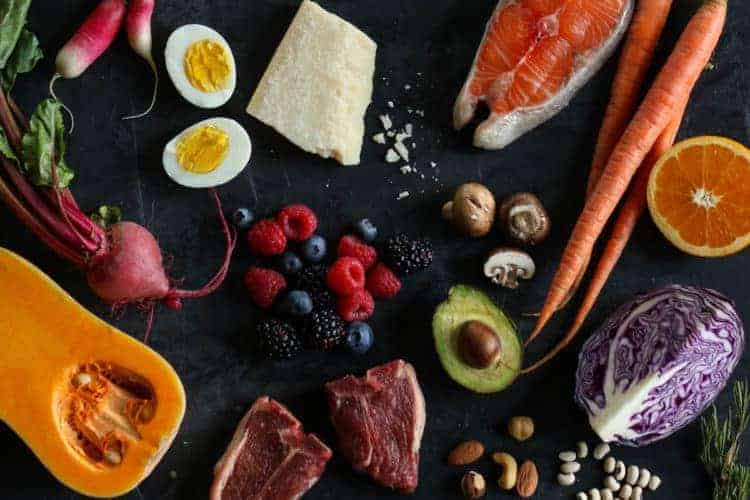
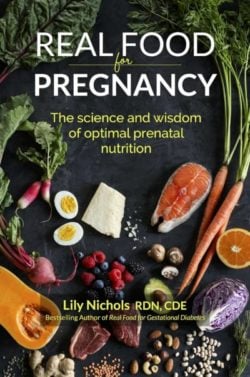
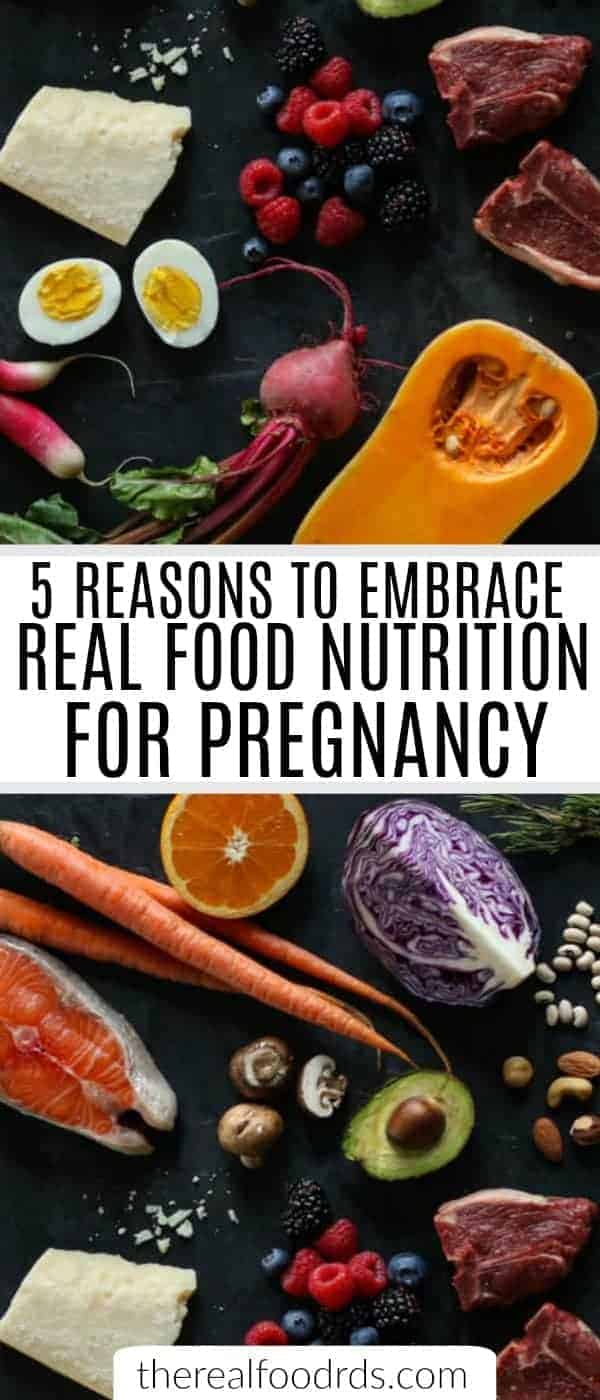
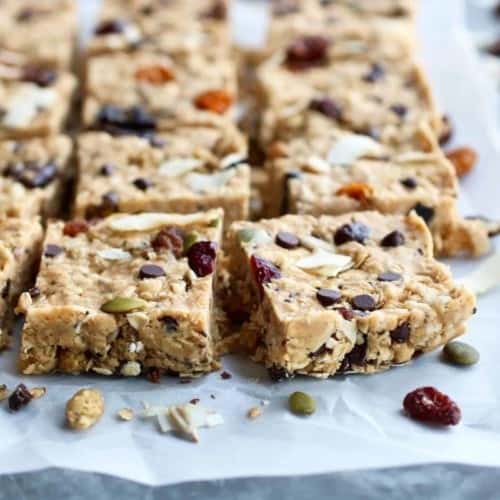
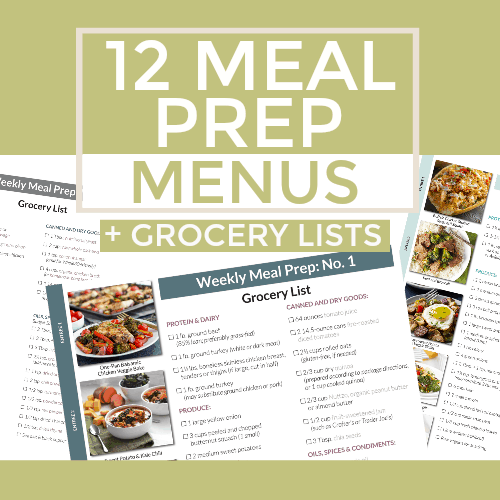
Great article Lily! I eat a diet consisting of mostly “real foods”. However, during pregnancy I get extremely nauseated in the am and the only thing that makes me feel better is a handful of processed crackers or non-complex carbs. Do you have a healthy alternative?
When it comes to nausea, you have to do the best you can. You can try experimenting with some snacks with less carbohydrates and see if it still helps your nausea (i.e. salted cashews in place of crackers). If not, do whatever you need to do to get through the nausea and once the feeling passes, aim for something that’s more satiating (like eggs, Greek yogurt, etc.). Mindful eating trumps dogma every time. If you need more strategies to try, check out Chapter 7 of Real Food for Pregnancy.
Thanks for this article. I am currently 8 weeks pregnant and have been plagued by horrible all day morning sickness and severe food aversion. Together, these make it extremely hard to eat anything at all… but I can seem to manage to choke down a bland cracker or cereal. I’m so disappointed in this because I ate a whole food diet pre-pregnancy, and hoped to maintain that diet during the pregnancy, but I just can’t right now. Any advice?
Hi Racheal,
First of all… congratulations! Secondly, don’t throw the baby out with the bathwater just yet. Many women find that morning (or all-day) sickness prevents them from eating an ‘optimal’ real food diet in the early part of pregnancy. Speaking personally, I suffered from severe nausea with both daughters until 14-16 weeks during which time I lived on whole wheat bagels, strawberry jam and Peanut Butter Puffins (right out of the box) – no kidding. I remember feeling like a failure but I also knew that any calories I could keep down at the end of the day were better than nothing. Once the morning sickness and vomiting subsided however, I was able to return to my usual diet and eat all the healthy things, go on to gain a healthy amount of weight and naturally give birth to very healthy babies.
Hang in there! It will get better. For now, do what you can – and if that’s crackers and cereal trust your body and trust the process. No guilt allowed, okay? You’ll be amazed at how different things will be once that 2nd trimester rolls around.
I found a typo:
however your diet and lifestyle can PLAY a role. (not PLAN)
Found in this paragraph in
3) Reduce Chances of Complications
There are countless other examples I could mention, but this gives you an appreciation for the power of real food. Again, this is not to say that all pregnancy complications are avoidable, however your diet and lifestyle can plan a role.
Thanks! Change made.
This is amazing! You all should put together “pregnancy power meals”
That’s a great idea!